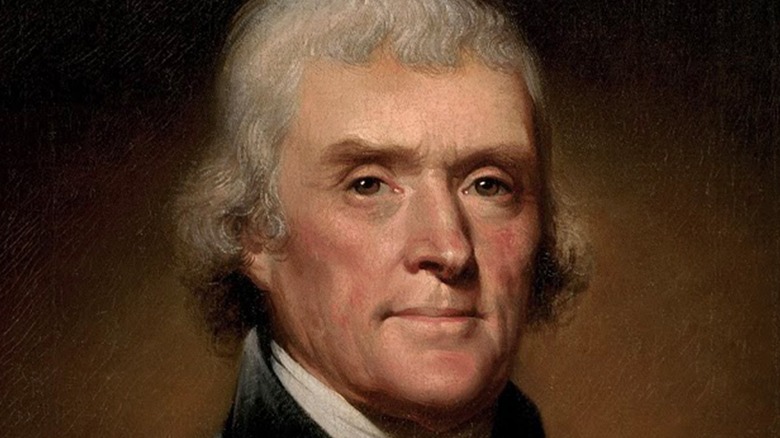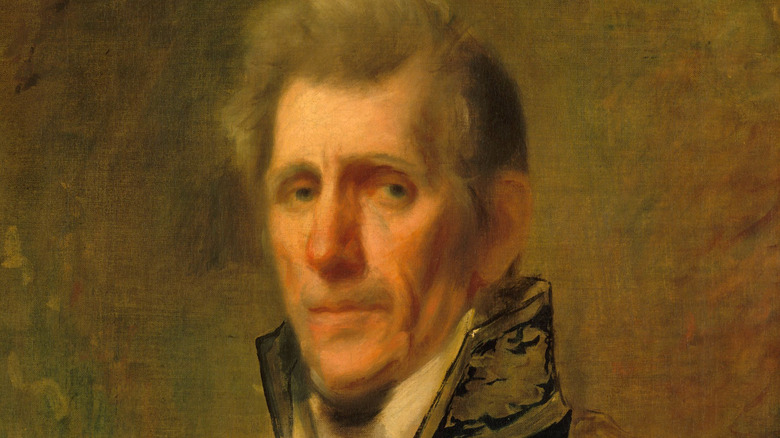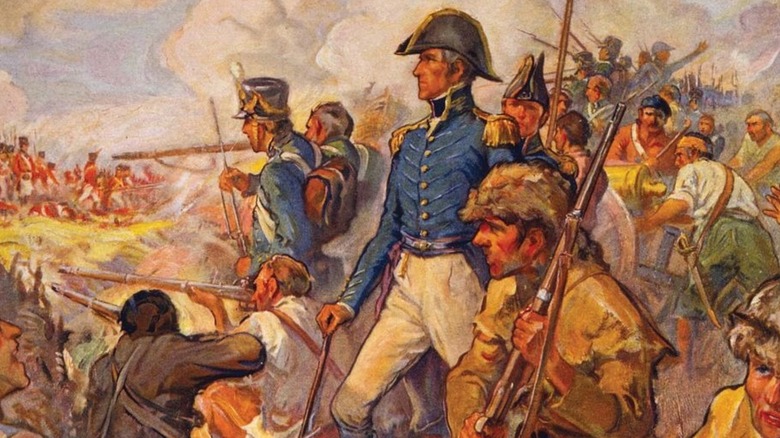How The Battle Of New Orleans Helped Kill The Federalist Party
In the history of the United States, the Federalists are probably one of the more influential political parties. After all, the Federalists counted Alexander Hamilton and George Washington as early founders and members. But there is a reason why the Federalist party doesn't exist today, and it's all thanks to the Battle of New Orleans and the end of the War of 1812.
According to History, the Federalist Party began in 1794 after Thomas Jefferson (pictured above) started his party, the Democratic-Republicans (it's the Republicans, but not the same Republican party today). Jefferson and James Madison disagreed with Washington and Hamilton over signing a treaty with the United Kingdom. The Founding Fathers never intended to have more than one political party, but it was inevitable in an administration full of strong personalities who created a country. The Federalists started the national bank, now the Federal Reserve, crafted early American foreign policy, and established the judicial system.
The Federalists dominated American politics for years, but their light faded during the presidency of John Adams. From that point on, they became the minority party, although they still remained a political force until the War of 1812 began.
At first, the War of 1812 was good for the party. The Federalists opposed the war, and so did many states who threw their support to the party. But President Madison declared the war, and people questioned why they continued to oppose a war already underway.
The battle begins
The War of 1812 pitted the relatively young United States against Great Britain. The Federalists disliked the idea of mounting a possibly expensive war. The Democratic-Republic administration of Madison fully supported the war, and he wanted all states to offer up their militias to help fight. But states like New York, New Jersey, and Connecticut did not wish to send their men, said History. The Federalists thought they could use the war to regain some of their previous popularity. The war was deeply unpopular when it started, and the United States seemed to be losing against their former colonial overseers, the British. What the Federalists didn't count on was the Battle of New Orleans.
The fighting in Louisiana began in 1815, wrote The American Battlefield Trust. France had been defeated by the British, who could now turn their focus on the Americas. The commander of the Seventh Military District, Andrew Jackson (above), the future president, heard the British planned to attack New Orleans. He quickly assembled a ragtag group of soldiers that included the pirate Jean Lafitte to defend the city.
The Battle of New Orleans shouldn't have even begun, said Mental Floss. Both countries already signed a peace treaty, but British generals felt the United States would fail to ratify it and wanted one last shot at the Americans. Jackson, of course, knew nothing of this. All he knew was that the British were about to attack. And so, the Americans hastily built barriers preventing the enemy from advancing towards New Orleans.
In the end, the Americans repelled the British.
Their timing is terrible
Winning the Battle of New Orleans turned public opinion for the war. Bad news for the Federalists in Hartford, Connecticut, discussing whether or not New England and northern states, the states that support the party, would secede from the Union, explained Smithsonian Magazine.
Prominent Federalists persuaded others to remain in the Union and instead crafted a list of constitutional reforms, such as ending the Three-Fifths Compromise, which gave southern states over-representation; bar naturalized citizens from government office; and limited powers declare war, said a paper from the University of Connecticut.
Unfortunately for the Federalists, the optics of a political party discussing possibly breaking away from the United States after its army just dealt a massive blow to the British was not good. History pointed out the party was more concerned over commerce and nation-building than recognizing popular support for a war they opposed. Suddenly, the Federalists were branded as traitors because they didn't celebrate American might during the Battle of New Orleans. It was as if the party didn't want the US to win.
The Federalists tried one more time to win the presidency, in 1816, but they lost to Madison's successor, James Monroe. It became very clear that the Federalists no longer had the support of many delegates. Despite being one of the first political parties in the country — even though it was the party of Washington — the Federalist party was dead.


